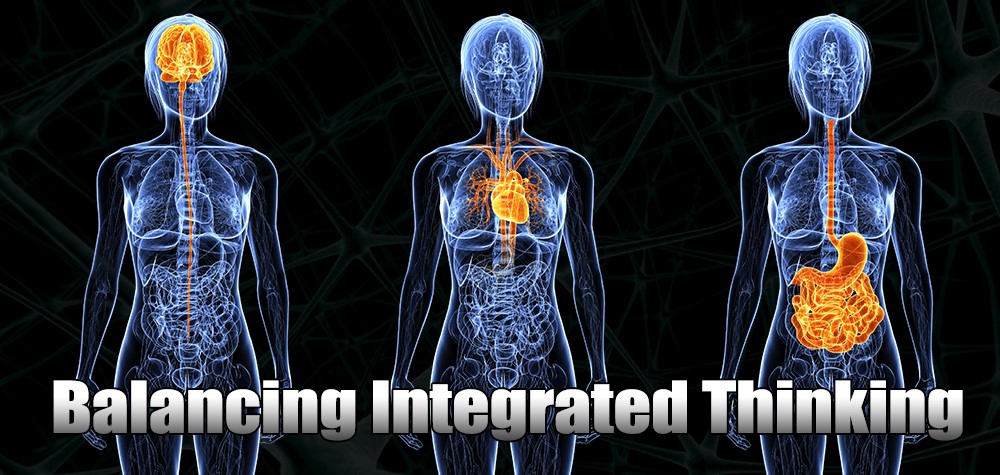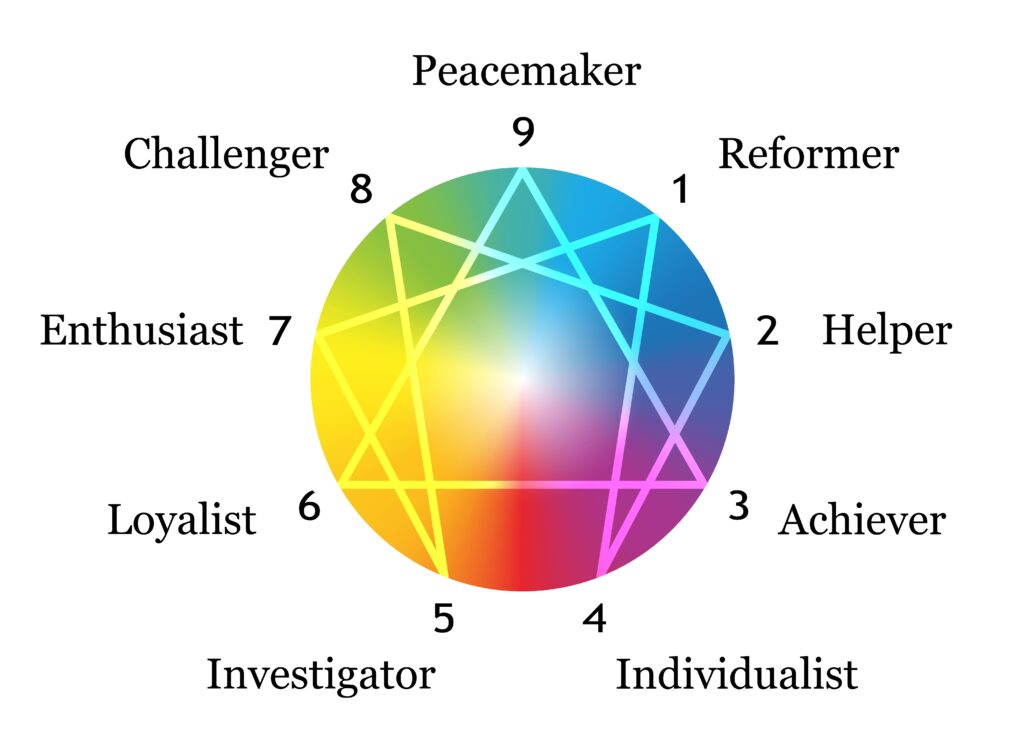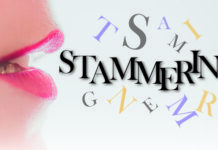Do you know how your internal wiring affects your personality?
Have you ever thought that you overthink things, worrying until you drive yourself to distraction? Or are you a people-pleaser, always putting another person’s needs before your own? How about decision making – do you take action, or procrastinate?
Most of us will answer yes to at least one of these things, although you wouldn’t necessarily be able to tell just by looking at them. The reason – well, according to science we all have three brains.
The science behind three intelligence centres.
Although science now explains them as complex neural adaptive networks, let’s call them brains. It’s shorter. Put simply, we are all led by our brains, our hearts and our guts.

We all use them instinctively but use them in different patterns. And the way we are wired to use them affects everything we do.
Here’s how you can tell:
Are you led by your brain?
If you find yourself overthinking things and worrying all the time, you may be led more by logic and “intelligence”.
There is a lot of emphasis on intelligence. In fact, we are led to believe that our academic success is a measure of who we are. Schools are geared this way, conditioning us to think this is a measure of what we are capable of and the value we offer society. Bullshit. The good news is, science is validating that we are more than a head on legs.
Are you led by your heart?
When our heart “brain” is leading the way, we can over-focus on supporting others’ needs and consequently have little to no recognition of our own, or even feel guilty, if you have your own needs.
Women are culturally conditioned to believe it’s a good thing to put others first at all times – we become known as carers. However, young boys, who start life just as sensitive as a girl, are often told to “man up” and “be strong”, to stop showing their feelings when they are upset or hurt. Then we wonder why they are unable to understand feelings later in life.
Is your gut leading the way?
The role of our gut “brain” is action taking. It is where we recognise if we are safe or not. Literally, are we going to survive if we move towards something or should we back off to save ourselves. Ever had that gut instinct? Even before the information reaches your
head brain, your body has a built-in sensor for survival. However too much gut and it drives us forward sometimes without thinking of consequences often to land ourselves in trouble; hindsight is our teacher here.
Procrastination is a way to keep yourself safe only you don’t consciously recognise why. We usually just mentally beat ourselves up adding insult to injury making ourselves feel crap. The gut brain is a major player in our personality and where real lasting change takes place. Who we take ourselves to be, our self-identity resides here.
The good news and the good news
As a certified mBIT Trainer and Master coach, I’ve spent decades studying the mind body connection. The latest neuroscience now validates we have three intelligence centres. We now have tools that help to balance them. When balanced, our body mind system comes into what is known as coherance…our brains aligned. From alignment, we have access to our higher wisdom, we make wiser decisions and are ready to take RIGHT action.
How do I know this? Because along the way I have had to set goals, identify the steps I needed to reach them, and manage the self-sabotage I felt along the way when one brain took over.
Building your neural adaptive networks
Each of us is born with our neurology – our wiring – in place. Even before we are born, we begin learning from our mother’s emotional world. Form birth onwards we feel and sense our way through sensory input.
This sensory data is processed by our nervous system — unconsciously always looking to keep us in a state of balance: our “norm”.
Recognising your personality type
The challenges we experience in life are often difficult to overcome because we are trying to figure things out when our brains are not aligned. Whether that is relationships, work or how you feel about yourself. You may start to feel that things inside you are broken – and no wonder. These wiring patterns are directly linked to your personality.
What this means is that by recognising your personality type you can shine a light on how your wiring is conditioned – with awareness comes choice, do you want to respond the way you usually do?
The Enneagram personality types
Interestingly, what science is now validating and identifying as your three intelligence centres has actually been recognised for a long time. In fact, the first known way of categorising these personality types is called the Enneagram, and predates Christianity.
The Enneagram doesn’t put you into a box and define you – instead, used correctly it’s a tool that shows you the box you’re already living from. Everybody contains all of the personality types to some degree. By recognising which one is most similar to yourself, you can identify how you filter your world. It becomes more recognisable under stress.

1.The Reformer
This person might be accused of being judgemental as they focus on being right or doing the right thing. What we don’t see is that, as well as pointing out the flaws they see around them, they are toughest on themselves, with a very unforgiving inner critic.
2.The Helper
This person is always trying to support and help others to the exclusion of recognising their own needs. Whilst their focus is on others, they are not feeling their own pain.
3.The Achiever
This person will look to accomplishments to feed their value. If they are not getting external validation, they have difficulty recognising their own worth.
4.The Individualist
This person feels strangely unique, and that no one really understands them. They have really strong emotions and can go to great depths in their emotional wave. Consequently, they feel that they do not fit in.
5.The Investigator
This person very much lives in their head. Their focus is on getting to the depth of intellectual understanding on something, often to the exclusion of those around them and their own basic needs.
6.The Loyal Sceptic
This person is always looking for what might go wrong so that they can have contingency plans. To be forewarned is forearmed; they will go to great lengths talking to different people to validate their concerns.
7.The Enthusiast
This person finds it difficult to be present in the moment. Most of the time they are looking ahead to what is next, and therefore often live in a state of frustration. Often seen as the charismatic life and soul of the party.
8.The Challenger
This person feels they need to control others and circumstances to feel safe. They are very assertive and wary of letting their guard down in case other people take advantage of them.
9.The Peacemaker
If this person speaks up, they run the risk of upsetting others. That internal conflict keeps them from having a voice or an opinion. They can understand so many points of view, they have difficulty establishing their own, and so often feel overlooked.
Identifying your personality type may be easiest by finding the one trait you are most proud of, the thing that you do so well that others validate you for it. It is both your gift and your challenge. You are able to bring your gift forward to make it your unique contribution to the world. But over-use it, and it becomes a challenge.
This is the starting point, from which we can raise awareness of our inner self and begin to reconnect ourselves.
Using the science behind the Enneagram to reduce your stress no person is static. We are pruning and creating new wiring every minute of every day. And we can retrain ourselves, we can face our internal challenges. You don’t have to avoid sharing your opinion, procrastinate or worry constantly.
Instead, by understanding the science – and the far older ancient wisdom of the Enneagram – means you can bring together your three “brains”, mind, heart and gut, and reach a higher understanding of yourself.
You’ve heard the phrase “listen to your gut” or “have a heart”. Well, now you know what they mean. Every conversation we have we are speaking our wiring; it is in your words and your behaviour that it will follow! Look out for it.
Would you like to know more? Leave me your email address and I will send you a short test to help identify your personality lens. www.susanfrend.com/contact
Also, events are delivered locally in Staffordshire, check website for details.
Sue Frend is a certified mBIT Trainer and Master-coach with over 30 years in the personal development field. Her mission is to help people understand their inner critics and give them the tools to find balance and improve mental and emotional wellbeing, and believes this should start in early education. Prevention is better than the cure.
Resilience Coach and Trainer
www.susanfrend.com










